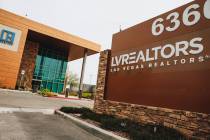ADA and FHA define service animal differently
Note: This Sunday, I turn my column over to a local attorney.
Our law firm perennially teaches continuing education courses in Southern Nevada about federal and state fair housing laws that affect common-interest communities. One component of this presentation focuses on requests made by homeowners associations’ residents for reasonable accommodations or modifications to an association’s rules for assistance and support related to a disability, and sometimes, the potential use of a service animal for assistance. More often than not, when the phrase service animal is first thrown out to a presentation audience, a lively discussion ensues.
What is it about service animals in an HOA that elicits emotion from all over the spectrum?
For one thing, almost any conversation about the use of service animals inevitably raises questions regarding the application of two separate but authoritative federal laws — the Americans With Disabilities Act and the Fair Housing Act — that both define and regulate the use of animal disability assistance within common-interest communities. In my experience, the misunderstanding of the scope and application of these laws tends to cause mass confusion. While both were implemented to prevent discrimination, which applies, and where and when? In other words, what are the similarities and differences between a service animal in an HOA under the Americans With Disabilities Act and under the Fair Housing Act?
The Americans With Disabilities Act is a federal civil rights law that prohibits discrimination on the basis of disability specifically in the areas of employment, public entities (school districts, cities, etc.), public transportation and public accommodation (access to businesses, restaurants, hospitals, etc.).
With regards to service animals, ADA laws enter the HOA arena when animal assistance is required for disabled individuals to accommodate areas of a common-interest community that might be considered to be public facilities, such as pools and clubhouses. Under the ADA, service animals are not considered pets and must be allowed to accompany people with disabilities in all areas of a facility where the public is normally allowed to go.
Because the ADA applies specifically to places of public accommodation, service animal issues under this law typically appear when animal assistance is needed for access and mobility within an HOA’s common-area facilities. Because common-area access tends to be infrequent, and only a couple of animals even qualify as disability assistance-capable under this law, the applicability of the ADA within HOAs is fairly limited.
The Fair Housing Act also prohibits discrimination in HOAs but with a substantially broader scope of application than the ADA. Passed by Congress in the 1960s as an addition to the federal Civil Rights Act, the FHA and its subsequent amendments protect classes of people with equal access to housing, housing facilities and housing services from various forms of discrimination, including race, color, sex, national origin, familial status and disability.
With respect to service animals, FHA laws apply anytime the resident of a dwelling in an HOA requests possession of an animal within a residence for assistance to deal with a disability.
Qualifying “accommodation requests” under the FHA require an association to modify its rules to allow residents to keep assistance animals in residential units. Because the FHA governs housing in private common-interest communities, service animal requests and issues under the FHA tend to be much more frequent in HOAs than the ADA.
There are some major similarities between the ADA and FHA. Both laws address federal civil rights and prohibit discrimination. Both allow for the assistance of service animals to support individuals with disabilities. Furthermore, both require the existence of a “logical nexus” between the disability and the need for animal assistance. In other words, the work or task being provided by the assisting animal must be reasonably related to the person’s disability.
However, intermittent service animal use at the pool or clubhouse versus full-time residence inside a housing unit means that the scope of application between these two laws differs vastly.
There are other significant distinctions, too. Under the ADA, public accommodation service animals are limited to dogs and miniature horses (in certain circumstances) that have been specially and individually trained to perform specific tasks. Thus, ADA service animals include dogs specially trained to guide the blind, for seizure alerts and for psychiatric service.
Conversely, practically any type of animal qualifies to be an FHA service animal if there is a “logical nexus” between the assistance provided and the disability, and no specialized task-training is required. That means dogs, miniature horses, rabbits, birds, cats, pigs or any other type of domesticated animal potentially qualify.
The FHA additionally allows for therapeutic or emotional-support animals (which similarly do not require specialized training), creating an even broader category of potential service animal assistance requests for HOAs.
In contrast, emotional-support animals do not qualify for access assistance in places of public accommodation under the ADA.
Understanding the basic similarities and differences between the ADA and FHA is helpful for anyone trying to figure out where service animals fit within an HOA. The highly regulated parameters of disability assistance by federal and state governments contain pitfalls and potential repercussions for the unwary. As such, anyone seeking clarification related to a service animal’s place within an HOA should seek competent legal counsel.
Troy R. Dickerson is the general counsel attorney for Angius &Terry.

















